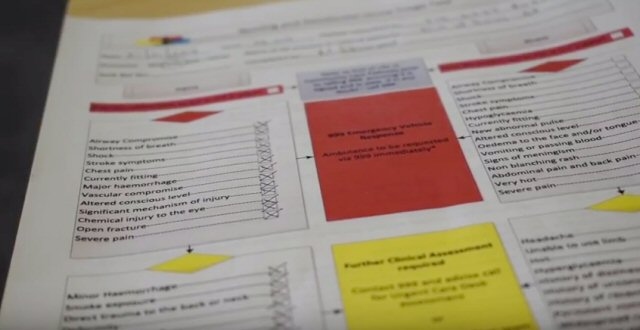Ground breaking paramedic tool aims to reduce ambulance callouts to care homes
Date published: 17 July 2017

Ground breaking paramedic tool aims to reduce ambulance callouts to care homes
Two paramedics have developed a new way for North West Ambulance Service (NWAS) to work with nursing and residential homes to help residents to get the most appropriate care more quickly.
Staff at nursing and residential homes can now be trained by NWAS to use the ‘Nursing and Residential Triage Tool’ to determine themselves whether a patient requires an emergency ambulance or it would be more appropriate for them to be cared for by a GP or urgent care service.
Specialising in working in the community, Paramedic Mark Wenman found that around 6.8% of all 999 emergency calls in the North West were callouts to nursing and residential homes, and of these almost 19% did not require hospital treatment, which is why he enlisted the help of Triage Development and Evaluation Paramedic, Steph Allmark and started looking into a way to improve this.
Mark said: “Patients in care and residential homes are often much more comfortable being treated where they are without the need to be admitted into hospital and wherever possible we will do everything we can to make sure this is possible.
“This tool is not only hugely beneficial to the ambulance service as it frees up our vehicles and crews for serious and life-threatening emergencies, it also means that the patient is treated in a surrounding that they are used to with people that they know.”
The tool works by allowing carers, who have prior knowledge of the patient’s health needs, to look at the symptoms being presented and using to tool to find the most appropriate care based on the world-renowned Manchester Triage Tool.
Initially using the tool in just three care homes in the area, its success has now meant that it has been implemented in over 50 across the North West with a view to expand to over 200 in the coming months.
Using the tool has proven successful in trials and has reduced 999 calls to nursing and residential homes by over 50% in some cases.
Care home staff are initially trained on how to use the tool by an NWAS professional and are then able to refer to the tool to help decide on the most appropriate care based on the symptoms being presented by the patient.
Do you have a story for us?
Let us know by emailing news@rochdaleonline.co.uk
All contact will be treated in confidence.
Most Viewed News Stories
- 1Middleton school hails another outstanding inspection result
- 2Former councillor and hospital campaigner Jean Ashworth has died
- 3Drugs and cash seized during morning raids at suspected stash houses
- 4No trams between Oldham and Rochdale this Sunday
- 5Northern Healthcare opens supported living service in former Rochdale hotel
To contact the Rochdale Online news desk, email news@rochdaleonline.co.uk or visit our news submission page.
To get the latest news on your desktop or mobile, follow Rochdale Online on Twitter and Facebook.


